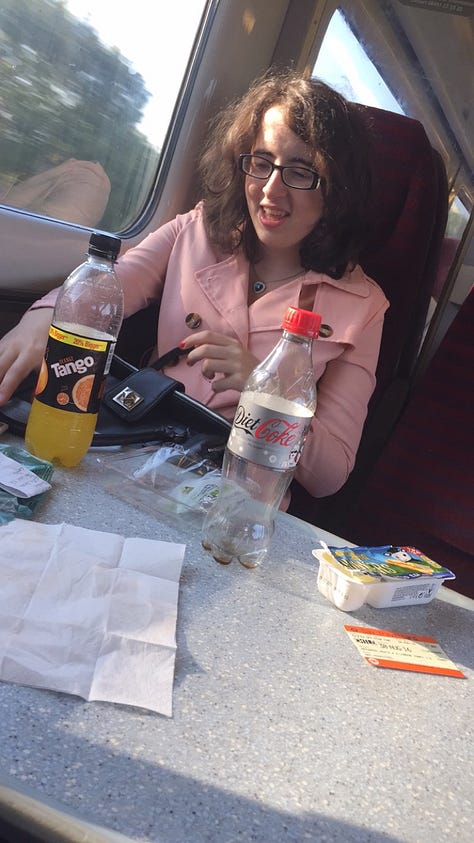
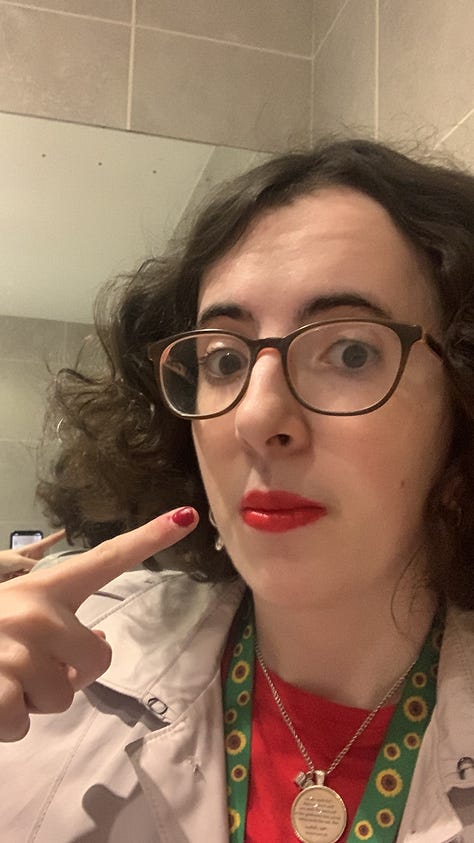
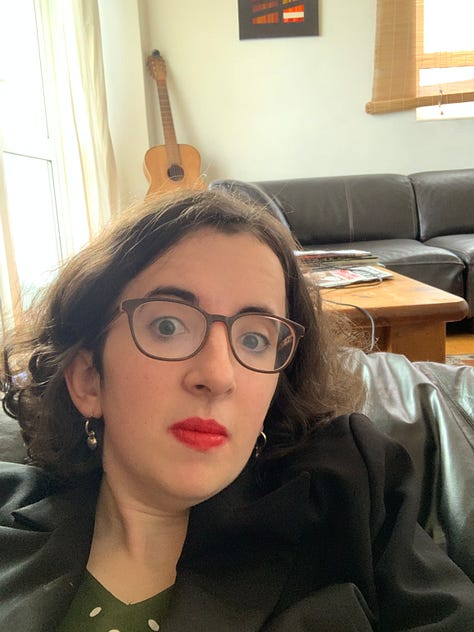
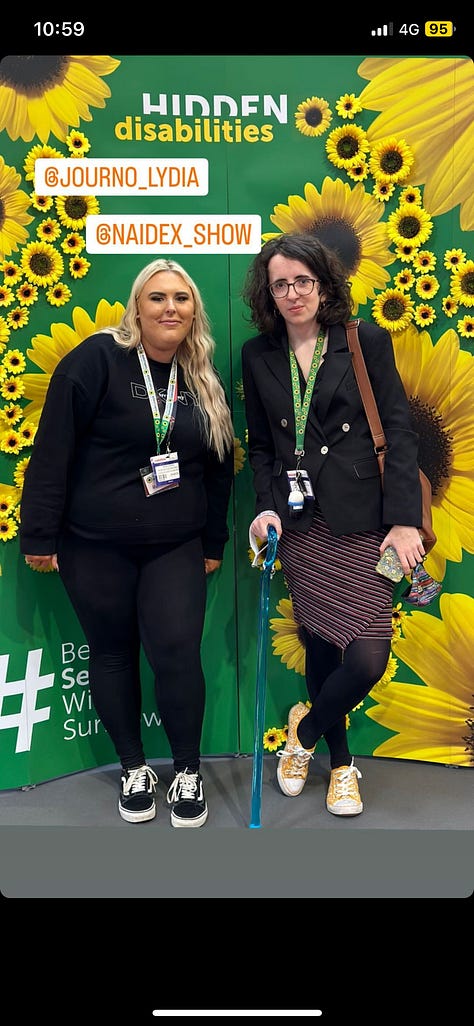
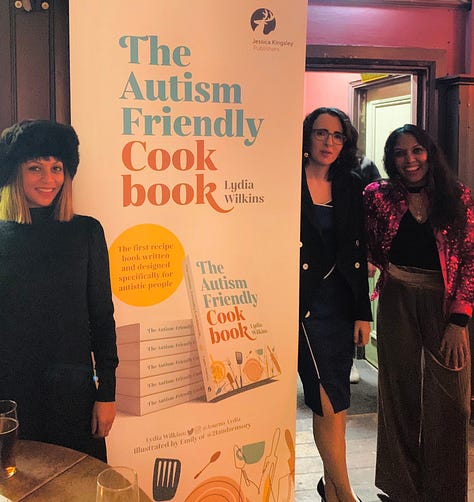
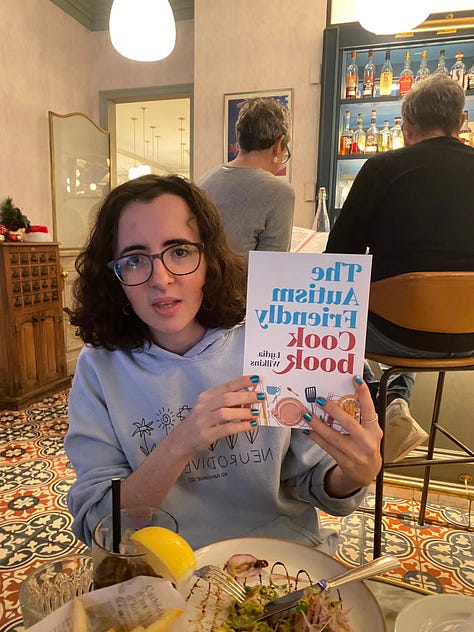
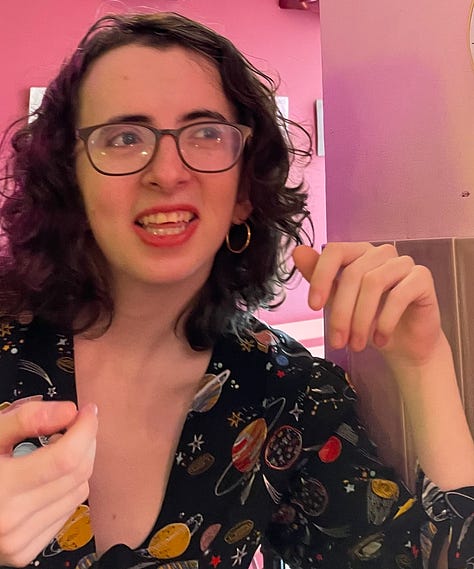
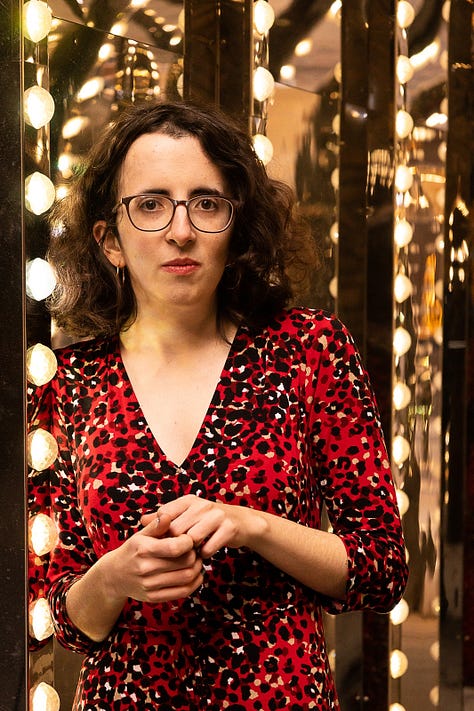
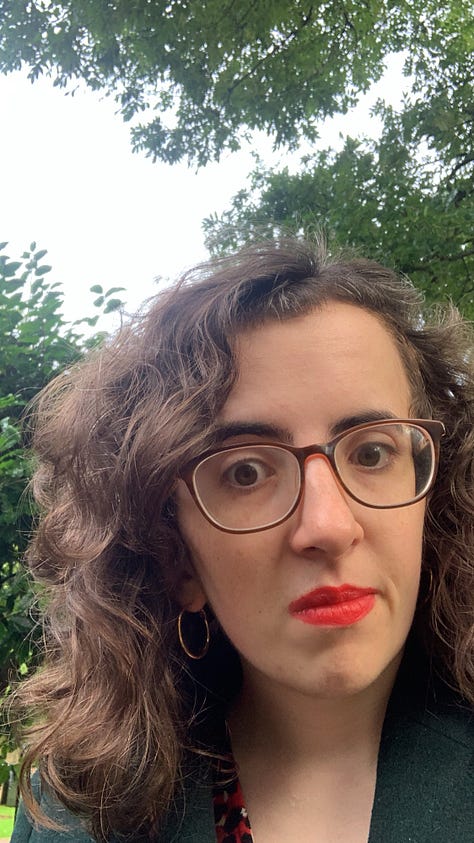
Today I turn 26. It’s also the third anniversary of when I finally left quarantine, the start of the process in having to grapple with Long Covid; it has been something of the extremities, personally. It has been a long three years.
All but one of these photos is from 'the aftermath’; photo two is on the day of ‘release’, holding myself up and in pain in my bathroom, in response to a relative asking for a photo.
They all have a ‘healthy’ look to them, even when at my sickest - such as in needing assistance to stand (for not very long or strategically leaning), or struggling to hold up my arms. (Now at least two photographs show that.) She’s still disabled whether or not she has the staple red lipstick and hoop earrings. Yes, she’s going to post collected photos on her newsletter to make this point once more.
I’m often asked what I’ve learned along the way. Usually it’s friends who come to me for assistance in navigating the NHS’ broken pathways and medical ableism/sexism, or people at work who lack a diagnosis - including the ever-elusive BPPV. (And that’s an under-recognised issue with Covid 19, no less. Nothing to do with weight or gender. *Sighs*. Because of course, let’s blame the woman!) I miss a lot - such as going for a run with my headphones, being able to walk freely without becoming breathless, enjoying other activities freely and without hinderance.
In the spirit of sharing, I was inspired by this piece by
. I’m by no means the wisest person, but this is what I have learned in the time since catching COVID 19 and becoming physically disabled:I look for safety in people, not the excitement. I am tired of the attention economy of novelty and names, the lack of care given to friendships and relationships. I value people who are emotionally safe, who ‘get it’, who allow me agency and autonomy - a better option than the calibre of ‘OH MY GAWD YOU’RE VULNERABLE, SHUCKUMS!” I’m tired of being made to feel like I don’t matter - such as by being ghosted or those who do not show up, but who go on and on about caring about ‘vulnerability.’ That’s just social kudo without the person attached. I look at pictures like these taken at Naidex this year - I remember thinking, this is where I want to be. There’s a safety and a smile not seen very often, stood next to allies and friends from far across the world. We aren’t so different, you and me.
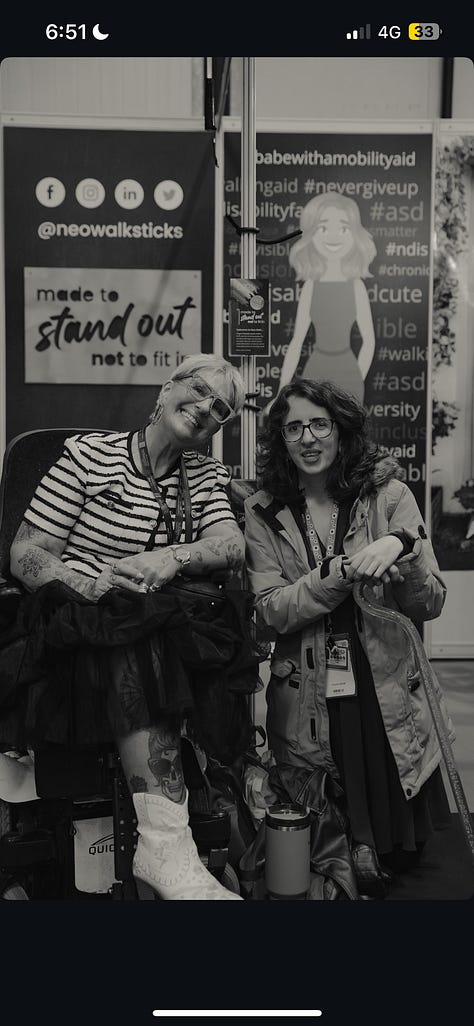
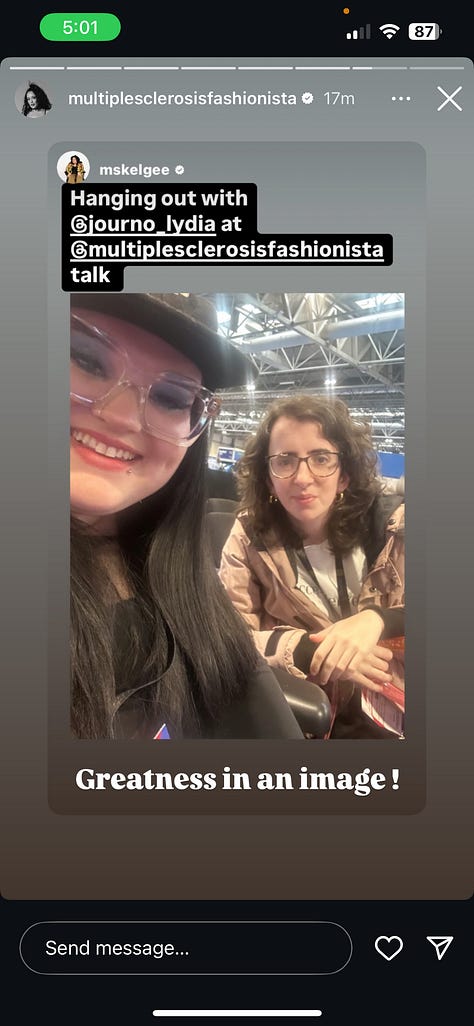
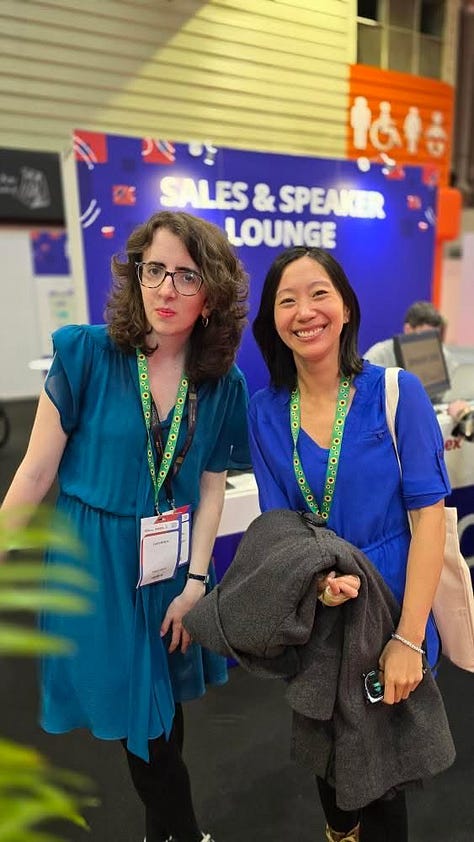
I’m opting out of social media culture now. You can opt out of so-called culture wars, because that is how the internet is made; you feed the beast based on the arbitrary reasoning of a competitive algorithm that is designed to literally amplify outrage. If you see me on there, it’ll just be to share my work, or on the hunt for a story for Disability Review Magazine. Jon Ronson has noted recently how all people do on social media is shout at each other. Rage will rot the soul. And all creative work will be taken by companies like Meta - **** Zuck. Meta has stolen the work of millions of authors. Why the Hell are we opting in to enrich their pockets, by giving them our creativity?
It’s also a ‘no’ to echo chambers. So - it’s a no from me on the group chat, the collegiate groups of ‘causes’ without anyone associated with said cause involved, comment pods on Instagram, freebie feedback to companies in the DEI space with no interest in that same feedback, etc. A whole other world exists outside this tiny universe. I am so much more interested in that. You want to change the world? Get organised and pool your resources, start listening and actioning appropriately and proactively.
And the same goes for journalists and those in the world of publishing. Why are we ‘surprised’ by the lack of disabled journalists? Spare me the faux outrage and organisations who don’t have disabled journalists or writers on their board. We know the problems, and the solutions already. The same conversations on repeat achieve absolutely zilch. It’s disingenuous to believe otherwise. Spare me the theatrics. Spare me the despair of what happened with, say, Unbound. See above point: get organised. Deeds, not more bloody empty words.
The internet was built on an algorithm of being competitive. I see this reflected in our culture, now more than ever before - such as with friends who feel the need to compete with each other. That just seems utterly exhausting to me - can we not? That’s not connection - that is just competition. One person always has to loose in the end.
Short hair? Never again. It’s just not for me, and is incredibly hard to maintain. I’m also not down for commentary on curly hair being ostensibly the worst thing ever. I like how I am, there is no point wasting time pretending or wishing to be another person; uninvited commentary is not welcome.
Boundaries are meant to be inconvenient. It is not ‘playing the disabled card’, whatever that means, to be expect to be treated.. well, with actual decency. This is just emotionally healthy, to have a statement of equality to abide by. They are a standard of treatment for the self.
Pink lip over a red lip. So much less messy such as when you need to drink or are on assignment into the early hours.. Chanel do a great pink lip balm. Yes, I consider it a worthy investment. Yes, it’s because I like to collect things. Red is the rarity for when I need to feel just that little bit braver.
It’s a radical act to like and accept yourself. That reflects in our relationships with other people - and it’s quite a powerful statement to make when you think about it. Show up for yourself to do the same for other people.
Angry? Go use that energy to make space, instead of tearing other people down. Being hateful is exhausting. Two friends of mine experienced the worst kind of trolling recently - and it just seemed exhausting, to have to put up with this ‘it’s just a joke’ culture. *Sighs* So much more could be achieved elsewhere. You can’t account for every single person while writing; it’s okay for a form of media not to be for you, because it isn’t personal. And you don’t need to make that person feel like absolute shit for it.
Shame Must Change Sides - and that needs to include men, such as on the topic of body image.
“Always ask the question that will fuck the story.” - not an original of mine, but imparted ‘wisdom’ of a useful nature.
You can have your opinions, but you do not get alternative facts. I think of a pensioner who was interviewed recently on a news website, having written an essay called ‘poverty is in the eye of the beholder’. Sheesh. It’s almost as if we actually can measure and monitor such a state. It’s not an illusion, it is a real thing. I pity you for your anger and your ridiculousness, how infantile we have become by weaponised incompetence.
Introverts pretend to be extroverts - they are everywhere in plain sight. You can transverse the two if you tap into the language that is hidden right in front of you. To be seen, or to articulate that emotional intimacy, has an incredible power.
People who are not disabled are thinking far more about themselves usually. Unless you’re the Department for Work & Pensions. Another state body that must be abolished.
“If you don’t ask, you don’t get.”
Protect. Your. Energy. Like. Your. Life. Depends. On. It.
I actually really enjoy food, when you take away arbitrary rules and reasoning. And that includes ‘helpful’ commentary from strangers. We insert so much unhelpful commentary into the lives of people from the point of diagnosis - do you not think a child hears your sighs, your passive aggression? This isn’t okay.
Softness is not a crime. Neither is curiosity. And I need both most of all - I cannot deny that any more.
“Empathy without boundaries is a form of emotional self harm” -
‘No’ is a full sentence. Yes, it’s a cliche. But when in public, there are too many people - adults and children - who attempt to touch or take away my mobility aid, as if it is a toy. That includes multiple clinicians, who like to pretend it’s hospital policy for the cane to be taken away or examined. Even if phrased as a cutesy question instead of a direct command, you will not take my cane from me. ‘No’ is not always well received, but it’s setting up consent.
Laughter is a great access measure. If you can make it funny, you will gain an ally or two. People become less alienated.
People who wilfully misunderstand are not worth the time or inclination. No matter how much you explain, or how much time is spent on such emotional labour, if they are committed to not understanding, it’s a lost cause. (See also “we treat everyone equally here - so we won’t give you your disability accommodation!” That is known as a definitive breach of the Equality Act, no matter how hard or prolonged the justification otherwise.) You can explain until you’re blue in the face, but I will no longer be repeating the same conversations time and time again, going round in circles; I deserve to be treated equally, and to have access to hospital treatment and care, the same opportunities at work and access to non-hostile environments, just like everyone else.
See also: invasive questions. An example? It’s not appropriate to ask “why are there so many Autistic trans people?” on a story not involving anyone who is transgender - asked by a popular broadcaster in a 1:1 meeting, no less. I will call you on your need to ask “how do disabled people have sex?” and other hideousness. I am not your freak show or your curiosity.
I second guess myself way too much, for a multitude of reasons. And learning my way out of that has been tricky at times, it’s a work in progress. We will get there one day. To be continually undermined because of a disability is bound to result in this state of play; learning to trust yourself means to undo a lot. Why would anyone trust, say, a clinician, when access to healthcare is always under threat? What a statement of privilege, to just assume that of a patient.
Space is a necessity. And I need a level of control over my own space. That comes from a parent who was a hoarder, as well as other relatives who were hoarders - and the accumulation of just mess. It takes a little bit of time for me to reacclimatise.
I write because my adorable (informally) adopted niece and nephew will not have to put up with the current standard of ******** that is deemed acceptable when they become adults. This is the hill that I will die on, I will not be questioned or move positions. Why do we view restraint and seclusion as okay based on the stereotype of an Autistic person ‘liking’ quiet? Why is it okay to continually correct hand movements that are not hurting anyone, when showing, say, excitement? Why must we persist in the patholigisation of disability wholly and unabashedly? If one person is reading your work, that is a privilege - but a better world is always, and will be, possible. Run with it, take that liability, and don’t you dare let anyone tell you to be quiet.
If you like what you see, please consider subscribing to this newsletter. It’ll enable me to keep writing - and there are serious benefits to becoming a paywall subscriber, too. You’ll also be supporting a disabled writer at a time when disability rights are under attack. It’s my birthday today - make my day by subscribing?




Happy birthday🎉🎂 🥳